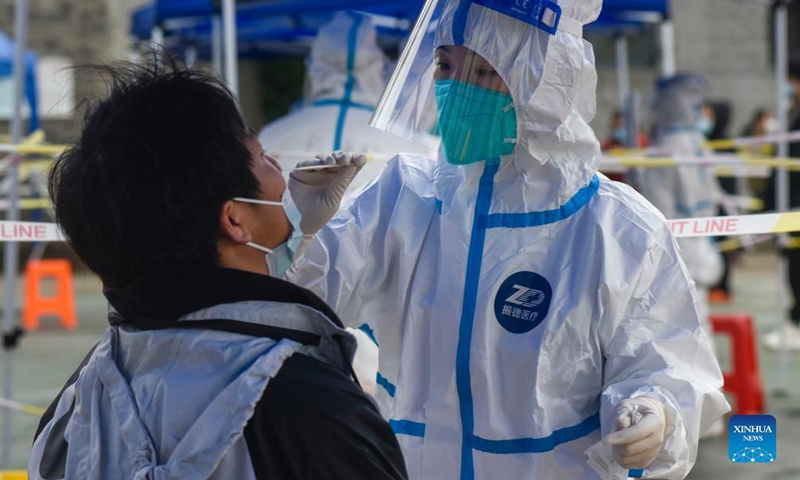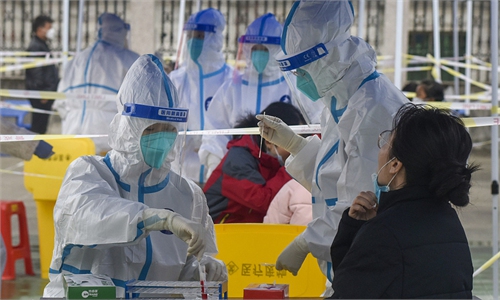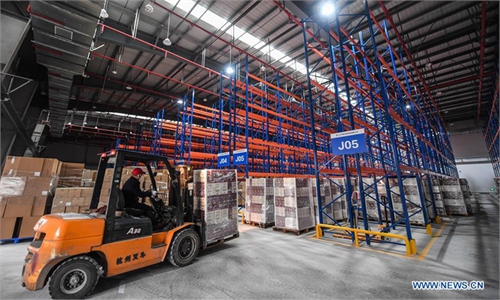New anti-virus measures in East China’s Zhejiang spark logistics backlog; ‘targeted approach’ reduces impact on supply chain

A medical worker takes a swab sample from a resident for nucleic acid test at a testing site in Zhenhai District of Ningbo City, east China's Zhejiang Province, Dec. 12, 2021.Photo:Xinhua
Businesses in East China's Zhejiang Province are facing logistics challenges which may impact clothing firms and other parts of the economy, after factory production and transportation channels in parts of the province were suspended amid recent resurgence of coronavirus cases, the Global Times has learned.
Starting from December 8, all companies, except for those producing essential products or personal protective equipment (PPE) in Zhenhai, a district in East China's Ningbo, were required to suspend production. On the same day, Shangyu district in Zhejiang's Shaoxing also required local companies to suspend production, with the only carve also being for firms producing PPE or other essential products.
Aside from halting production, the abovementioned cities have also taken restrictive measures on intercity transportation. Currently, Zhejiang has closed 10 freeway toll stations on five highways, while Zhenhai and Shangyu have suspended package delivery services. A total of 247 bus lines were also suspended in Ningbo and Shaoxing.
Shangyu is a key hub for textile dye firms, while Zhenhai is an important base for the domestic petrochemical industry.
Several local businesses told the Global Times that the suspension combined with new public health measures limiting the flow of goods and people has triggered logistics challenges for their companies, with truck drivers unwilling to enter the affected areas over concern that they may be ensnared in the implementation of new measures or subject to forced quarantine.
"We can't ship our products out of Shaoxing. Drivers from Ningbo are reluctant to come here, and warehouses in Ningbo are reluctant to accept our products," Jin Xiaobo, the CEO of Zhejiang Kaierhai Textile Garments Co, which is based in Shaoxing, told the Global Times.
This has caused headache for the veteran trader, with no means to ship products to overseas clients, particularly during what is the peak delivery season for clothing companies.
According to Jin, as the shipping space was booked in advance, it's very hard for him to shift to other ports as alternatives to Ningbo port which his company now uses.
"As far as I know, some companies have offered to pay extra money about 10,000 yuan ($1,572) to freight drivers, who may be required to undertake 14 days of self-isolation if they travel from Shaoxing to Ningbo," he said.
He also noted that the temporary suspension of production in Shangyu will strain the supply of clothing material for his company, with current inventory only able to be stretched out to cover around one or two months of use.
"All other problems like power restrictions and raw material cost rises can be solved, but a logistics interruption has no solution. This is the lifeline of businesses like ours," he said.Around 90 percent of Zhejiang Kaierhai's products are exported, mostly to the US and Europe.
However, the overall impact should be limited to certain industries and certain localities within the province, with general supply chains remain stable, businesspeople and officials said.
Ji Chengbo, a merchant exporting Christmas decorations in Yiwu, nicknamed the world's small commodity capital, in Zhejiang Province, told the Global Times that although the frequency of product pickup from Ningbo to Yiwu has been reduced by about a third, his business was not significantly affected as most Christmas orders have already been fulfilled.
Zhenhai has sought emergency measures to assist the local petrochemical industry. For example, officials helped local petrochemical companies apply for special authority to transport their products.
According to a report published on zjol.com.cn, Sinopec Zhenhai Refining & Chemical Company is being issued about 150 passes each day, which can essentially ensure the shipment of raw materials like sulphur and asphalt is minimally impacted.
A local official in Zhenhai also told the Global Times that Sinopec Zhenhai had not suspended production as it was deemed essential to the economy.
A Zhejiang transport official overseeing the development of China-Europe freight train service told the Global Times on Tuesday that there has been no impact to the freight train business due to the targeted, precise approach of pandemic control measures.
There is no impact to supply chains either, in contrast to early 2020 when the flow of goods was cut off after interprovincial traffic was blocked off, the official said.
"Now the pandemic is impacting separated areas, but overall the impact has not been noticed so far," the official said on condition of anonymity.
From December 5 to 4:00 pm Tuesday, Ningbo reported 55 cases of coronavirus, while Shaoxing reported 161 cases. Hangzhou of Zhejiang also reported 19 cases during the period.



